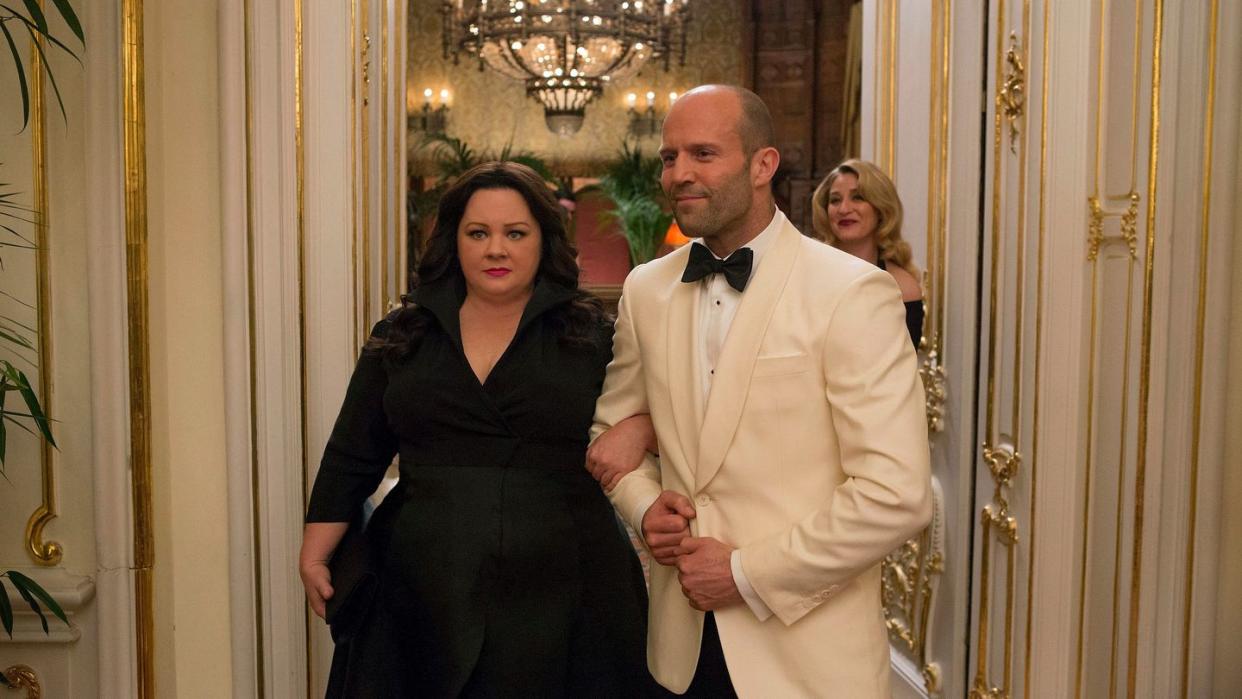Jason Statham Almost Never Smiles. That’s the Point.
"Hearst Magazines and Yahoo may earn commission or revenue on some items through these links."
LONG, LONG, AGO, the revered comic-sage Patton Oswalt made the definitive exegesis of Jason Statham, the pride of Shirebrook, Derbyshire, England; Oswalt’s original MySpace post is lost to time, but remains archived on Tumblr by the noble efforts of digital preservationists. The gist is that, yes, Statham headlines a lot of junk food cinema—action movies that surely don't require a whole lot of thought, but damn it if they aren't the most fun you'll have all week—but he knows how to show his audience a good time. Pay the price of admission, and he will, as Oswalt puts it, “fuck an explosion while a Slayer song plays.”
No more accurate summary of the Statham aesthetic has been offered since Oswalt wrote this sublime analysis. His thesis and conclusion nailed the “why” of what makes Statham movies work: It’s his willingness to go as far over the top as needed to entertain a crowd. What remains unlitigated in the intervening years between 2009 and 2024, however, is “how” his movies work. They’re absurd without any high falutin’ pretense, but that’s not the ticket; that’s just the text. They’re (mostly) well-choreographed, which is the least an action film can be, but that’s not it, either. Pointing to Statham as the secret ingredient is redundant in context with the “why,” and besides that, he’s the star—there’s nothing secret about him. No, the key is part of Statham, staring down at us from the big screen: his unfailingly stony mug.
Think of the last time you saw Statham smile in any of his movies—and for how long. A chuckle with Dwayne Johnson here, in The Fate of the Furious; a smirk in Simon West’s Wild Card there; a smug grin in The Transporter. Now think of Statham scowling. Take care not to pass out from memory overload, because “scowling” is the average range he brings to his characters. Very few leading men of Statham’s generation, or, really, any, are capable of glowering with the same intimidating effect. Forget about that explosion. Spend a moment with Statham and he’ll stare a hole clean through your chest, then through the wall behind your chest, and even then he might still punch you hard enough that you’ll be able to measure the Earth’s circumference.

Put on paper, all of these tough guy staredowns suggest that, perhaps, Statham ought to lighten up. Have fun. Spare at least two laughs per movie plus four toothy smiles. But that’s not the essence of Jason Statham. He doesn’t need to have fun in his movies, or look like he’s having fun to assure viewers that he’s enjoying himself; the movies do all of that legwork for him. In plots built around physics-defying car chases (The Fast and Furious franchise), prehistoric shark attacks (The Meg series), heart-stopping synthetic drugs (the Crank films), or baby fights (Fate of the Furious again), Statham necessarily plays it straight. Without his professional sobriety, these excesses might weigh down the films and rob them of their amusement. But Statham’s dour presence gives them an anchor with which to ground their innate absurdities.
Buy The Beekeeper Tickets Here
This applies to his latest beat-‘em-up, David Ayer's The Beekeeper, now in theaters. Statham plays Adam Clay, a seemingly everyday type running an apiary out in the middle of nowhere (who does, in fairness, slash a quick smile early in the movie’s going). His neighbor and best friend, Eloise (Phylicia Rashad), rents out her barn to him; theirs is a pseudo parent/child relationship, Eloise being the caretaker that Adam’s never had. Then a pack of data mining thieves trick her into surrendering the login for her bank accounts, and after they’re done emptying her pockets, she commits suicide, which sends Adam on a one-man revenge mission against the thieves and every crooked authority figure they’re connected to. This means blood. This means brutality. This means using honey as a napalm alternative. This means… Statham.

Consider this: We learn that Adam is, of course, not a beekeeper, but a Beekeeper, an ex-soldier from an organization that operates outside of America’s laws by performing violent regulation on corrupt ne’er-do-wells who throw it out of whack (by victimizing the innocent, like Eloise). As a former member of this organization attempting to lead a normal life, he needs a cover, of course; this makes sense. But instead of, say, starting an alpaca ranch or an organic farm, he chose to raise bees. Subtlety isn’t his strong suit. Nor is it screenwriter Kurt Wimmer’s, who is best remembered for Equilibrium, where Christian Bale plays a fascist lawman trained to effectively replace his fists with pistols.
That’s as ridiculous a conceit as anything Wimmer writes into The Beekeeper, but where Equilibrium has Bale’s gravitas, The Beekeeper has Statham’s no-nonsense machismo. Another actor might try to wring a genuine performance out of their casting, and make Adam into a fully fleshed-out, human character. It’s not that Statham rejects that effort out of hand—rather, Ayer and Wimmer aren’t terribly interested in giving him material to base the effort on. Adam is a bit of a cipher. No backstory is given about his military past or his bond with Eloise. That’s the sort of space Statham likes to work in, with just enough “there” to his character to keep them from being blank.

Think, for example, of Chev Chelios, the doomed-to-die hero of Crank, a hitman fatally poisoned by a rival in the criminal syndicate he works for. That’s it—that’s the brief. We know nothing else about Chev. We just know he’s inevitably going to die, and that if he, say, sticks his hand in a waffle iron, beefs with total strangers, mainlines epinephrine, or nails his girlfriend (Amy Smart) in public, the adrenaline burst will override the poison’s effect (think Speed, but with Chev's human body). Thin, perhaps, but nonetheless sinewy enough that Crank succeeds as tastelessly raucous spectacle. Or recall The Meg and Meg 2: The Trench, where Statham’s haunted rescue diver tracks and hunts and annihilates megalodons, giant sharks of the deep long thought extinct, but actually hidden nice and toasty warm in the Mariana Trench by a handy thermocline. In The Transporter 2, Statham’s unstoppable getaway driver hurtles off of a ramp and over a crane to pluck a bomb from the bottom of his car. Rinse, lather, repeat.
The list of stunts Statham’s characters pull off is endless, and he approaches each with a humorless duty. But that doesn’t mean Statham lacks a sense of humor—just that he withholds it in most of his work. In Paul Feig’s Spy, Statham plays the disgruntled field agent Rick Ford, embracing his comic side with the same stoicism he brings to Adam Clay. The ramping hilarity of his role, culminating in a rant about the various grievous and frankly fatal injuries Ford has suffered throughout his career, shoots Spy up on Statham’s list of all-timers. The tempting meta interpretation here is not only that Statham is funny, but he knows he’s funny, and chooses projects where his seriousness underscores the farce anyways. The movies supply the beeswax. He takes care of the beatdowns.
You Might Also Like
